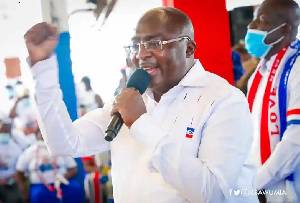In a recent address, Vice President Mahamudu Bawumia made headlines by mocking the National Democratic Congress (NDC) for what he termed a “24-hour majority†in the Ghanaian Parliament. His comments came in the wake of a significant political maneuver that saw the NDC briefly assume a majority status, only to lose it shortly thereafter due to defections and party dynamics. Bawumia’s quip not only underscores the volatile nature of Ghana’s political landscape but also highlights the ongoing rivalry between the two major parties.
Bawumia’s remarks were part of a broader critique aimed at the NDC's governance and their ability to maintain unity and coherence within their ranks. The reference to a “24-hour majority†serves as a potent reminder of the instability that can accompany partisan politics. It reflects the ongoing challenges faced by the NDC, which has struggled to consolidate power since the 2016 elections, when the New Patriotic Party (NPP) won decisively.
The Vice President’s comment resonated with many observers who have noted that political fortunes in Ghana can shift dramatically in a matter of hours. This incident underscores a growing narrative about the effectiveness of leadership and party loyalty, themes that are crucial as Ghana approaches the next general elections. Bawumia’s jibe aimed to not only mock the NDC but to also reinforce the NPP's image as a stable and united party, capable of delivering on its promises.
Political analysts have pointed out that this situation reflects broader trends in Ghanaian politics, where internal dissent can lead to rapid changes in party strength. The NDC, despite its historical significance and previous successes, has faced a series of challenges that have weakened its position. The recent events in Parliament, where the NDC briefly claimed a majority before defections reverted the status quo, illustrate the fragility of their current standing.
Bawumia's comments also serve to galvanize NPP supporters, reinforcing the notion that their party is the better option for governance. The Vice President's rhetoric aims to paint the NDC as ineffective and disorganized, thus rallying support for the NPP as a more stable alternative. His strategy reflects a broader trend in political discourse, where derision of opponents often plays a central role in campaign strategies.
The dynamics of party politics in Ghana are complex, influenced by various factors including regional loyalties, economic challenges, and social issues. As the country prepares for future elections, the ability of both parties to maintain cohesion and present a unified front will be critical. The NDC, facing its own internal strife and challenges, must find a way to rally its base and counter the narratives put forth by the NPP.
In conclusion, Bawumia's taunt about the NDC's “24-hour majority†not only highlights the immediate political turmoil but also speaks to deeper issues of governance and party integrity. As Ghana approaches a crucial election period, the interplay between these two major parties will be closely scrutinized, with the potential to shape the nation’s political future for years to come. The stakes are high, and both parties must navigate the shifting landscape carefully to avoid the pitfalls of their opponents.


